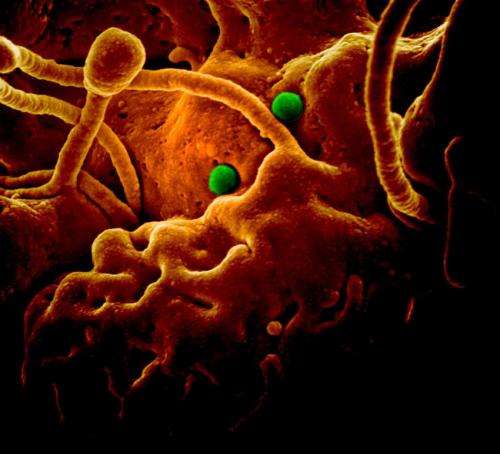July 28, 2015 report
Antibody found that fight MERS coronavirus

(Medical Xpress)—An international team of researchers has found a MERS neutralizing antibody—a discovery that could perhaps lead to a treatment for people infected with the virus. In their paper published in Proceedings of the National Academy of Sciences, the team describes the study they undertook that led to the discovery and why they believe what they found might lead to both prevention and treatment for the oftentimes deadly disease.
Middle East Respiratory Syndrome coronavirus (MERS-CoV) is an ailment that causes severe respiratory problems for those infected and has a high mortality rate. It is believed to have got its start in humans after jumping from camels (who got it from bats) somewhere in the Middle East but has subsequently been found in patients in many other places. The virus does not transmit from person to person very easily, thus the source of most infections is still not clear. To date MERS has killed more than 500 people in 26 countries since it was first identified back in 2012. The most recent outbreak has been taking place in South Korea.
Efforts to find a means of preventing people from falling prey to the virus or combating it in those afflicted have thus far failed. In this new effort, the researchers studied the immune response of a 49 year old male patient suffering from the condition, but whose immune system finally won out. In so doing, they were able to locate the specific antibody that they believe was instrumental in saving the man's life—known as LCA60, it binds to the virus when it encounters it, preventing the virus from binding to CD26 receptor cells.
The researchers tested the antibody in mice (by both injection and inhalation) and found that doing so caused a steep reduction in the number of virus cells in the lungs. Notably, they found that they got nearly the same results whether the mice were given the antibody before or after they were infected. This suggests it might be possible to inject the antibody into people at risk to help them fight off the disease and also to use it as a treatment for those that already have it.
More information: Prophylactic and postexposure efficacy of a potent human monoclonal antibody against MERS coronavirus, Davide Corti, PNAS, DOI: 10.1073/pnas.1510199112
Abstract
Middle East Respiratory Syndrome (MERS) is a highly lethal pulmonary infection caused by a previously unidentified coronavirus (CoV), likely transmitted to humans by infected camels. There is no licensed vaccine or antiviral for MERS, therefore new prophylactic and therapeutic strategies to combat human infections are needed. In this study, we describe, for the first time, to our knowledge, the isolation of a potent MERS-CoV–neutralizing antibody from memory B cells of an infected individual. The antibody, named LCA60, binds to a novel site on the spike protein and potently neutralizes infection of multiple MERS-CoV isolates by interfering with the binding to the cellular receptor CD26. Importantly, using mice transduced with adenovirus expressing human CD26 and infected with MERS-CoV, we show that LCA60 can effectively protect in both prophylactic and postexposure settings. This antibody can be used for prophylaxis, for postexposure prophylaxis of individuals at risk, or for the treatment of human cases of MERS-CoV infection. The fact that it took only 4 mo from the initial screening of B cells derived from a convalescent patient for the development of a stable chinese hamster ovary (CHO) cell line producing neutralizing antibodies at more than 5 g/L provides an example of a rapid pathway toward the generation of effective antiviral therapies against emerging viruses.
© 2015 Medical Xpress














